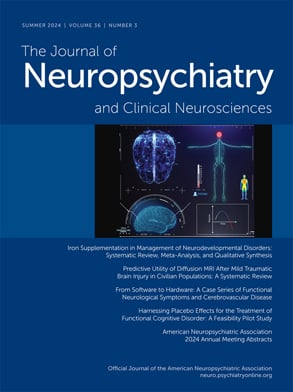SIR: Amyotrophic lateral sclerosis (ALS) is a disease of upper and lower motor neuron degeneration that manifests itself by a progressive weakness of muscles, with resultant signs and symptoms that include difficulty with ambulation, speech, hand control, and swallowing, as well as persistent fatigue, twitching, and paralysis. There is no cure for ALS, and although the newly approved agent riluzole may prolong survival, treatment is more commonly supportive in nature. Below is described a patient who developed ALS while being treated for depression and in whom adjunctive modafinil proved of benefit in the treatment of fatigue, sleepiness, and lowered stamina.
Case Report
Ms. A., a 56-year-old woman, was initially seen for major depressive disorder in the context of several life stresses and a past history of major depression. Her medical history was positive for intermittent migraine, and she was on hormone replacement therapy with estrogen and progesterone. During treatment with nefazodone 350 mg and sertraline 50 mg, Ms. A.'s depression remitted, but she noted a sense of unilateral upper extremity weakness and twitching in addition to tripping and difficulty with speech. Because she attributed these problems to her psychotropic medications, sertraline was discontinued and nefazodone was initially reduced to 200 mg and ultimately discontinued, with mild subjective improvement in her physical symptoms but a return of depressive and anxiety complaints.
Because of the patient's continued difficulty with weakness of her arm, comprehensive neurologic evaluation was initiated, including electromyography and nerve-conduction studies, cervical and brain MRI, and extensive laboratory testing as well as speech and ambulation assessments. Four neurologists were consulted, and the ultimate diagnosis was ALS.
Ms. A. started riluzole for ALS and citalopram 20 mg/day for depressive symptoms. In spite of psychiatric benefit with citalopram, Ms. A.'s physical symptoms progressed and included severe daytime sleepiness, weakness, fatigue, and reduced ability to participate in her activities of daily living. Modafinil was prescribed and increased to a maximum tolerated dose of 300 mg daily, with marked improvement in alertness, energy, and ability to participate in both home and outside activities. On two occasions over 6 months, Ms. A. ran out of her supply of modafinil and experienced an immediate exacerbation of weakness, fatigue, and sedation, with rapid improvement upon restarting this medication.
Comment
Modafinil is a novel wake-promoting agent approved for use in narcolepsy, although reports
1,2 of benefits in other neurologic conditions suggested consideration of this agent in Ms. A. as adjunctive treatment for her ALS-associated fatigue, sleepiness, and weakness. Activation of hypothalamic arousal centers
3 is a proposed mechanism of action for this agent, which may also have potential antidepressant effects.
4 Ms. A.'s case suggests modafinil may be a useful adjunctive agent for ALS.

